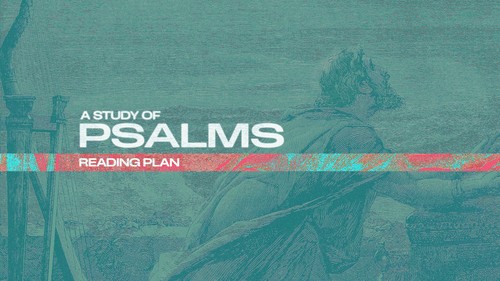A Study of Psalms - Week 05 Launch

Welcome to Week 5 of Study of Psalms! This reading plan is designed to partner with Compassion Christian Church’s sermon series of the same name, which you can find information about right here.
The Psalms of Ascent are our final psalms for this study. These Psalms are grouped together and reflect on the grace, mercy, provision and salvation of God. In Jewish tradition there are three major festivals - Passover, Pentecost, and Tabernacles. In the Bible days, families would travel to the Temple in Jerusalem to celebrate these festivals. As the families would make the pilgrimage and ascend the mountain that led to the city and temple, it was customary for these songs (psalms) to be sung. They later received the name Psalms of Ascent because of the way in which they were often shared with one another - being sung as they ascended up the mountain where God dwelt.
We are continuing to reflect on the Psalms through Lectio Divina. Which is a spiritual practice about slowing yourself down, finding the time to put away distractions and meditate on the scripture and examine your heart before the Lord. It might feel uncomfortable at first, but the more you practice and release any concerns about “doing it right” or “silence is uncomfortable,” the more God works on your heart and you long for these moments with Him.
There are six “steps” to Lectio Divina; these abridged steps were taken from Ruth Haley Barton’s book Sacred Rhythms.:
John-Mark Comer has said “The best place to begin is where you are, not where you want to be.” Remember this as you practice Lectio Divina, because where you are today is all God is asking of you.
Before We Start
Take the moment to watch the Bible Project's explanation of the ancient Jewish meditation of scripture. This meditation and outlook of reading the scriptures were influential in the early Church leaders’ development of Lectio Divina.
Ancient Jewish Meditation
Looking Ahead
This week's verses are Lament Psalms:
Monday, June 17 - Psalm 120-122
Tuesday, June 18 - Psalm 123-125
Wednesday, June 19 - Psalm 126-128
Thursday, June 20 - Psalm 129-131
Friday, June 21 - Psalm 132-134
The Psalms of Ascent are our final psalms for this study. These Psalms are grouped together and reflect on the grace, mercy, provision and salvation of God. In Jewish tradition there are three major festivals - Passover, Pentecost, and Tabernacles. In the Bible days, families would travel to the Temple in Jerusalem to celebrate these festivals. As the families would make the pilgrimage and ascend the mountain that led to the city and temple, it was customary for these songs (psalms) to be sung. They later received the name Psalms of Ascent because of the way in which they were often shared with one another - being sung as they ascended up the mountain where God dwelt.
We are continuing to reflect on the Psalms through Lectio Divina. Which is a spiritual practice about slowing yourself down, finding the time to put away distractions and meditate on the scripture and examine your heart before the Lord. It might feel uncomfortable at first, but the more you practice and release any concerns about “doing it right” or “silence is uncomfortable,” the more God works on your heart and you long for these moments with Him.
There are six “steps” to Lectio Divina; these abridged steps were taken from Ruth Haley Barton’s book Sacred Rhythms.:
- Preparation (Silencio) - find your space to be with God. Take a moment to quiet your mind, heart and body. Come to God fully open to be in His presence.
- Read (Lectio) - Slowly and out loud, read the passage. Pausing after sentences where it feels natural. Listen for the word or the phrase that God may want to speak to you about.
- Reflect (Meditatio) - Ask yourself a few of these questions: What is it in my life right now that needs to hear this? Where am I in this passage? What is God saying to me in this passage? What longing does this passage stir in me? How is my life touched by this passage?
- Respond (Oratio) - Read the passage again, then talk to God about what has come to your mind as you’ve reflected. Allow yourself to be open with God about your needs, your emotions and your reactions to what the Holy Spirit stirs in you.
- Rest (Contemplatio) - Rest in the Word of God. Read the passage one more time, and rest with God in it. Whether that is in silence or in prayer.
- Resolve (Incarnatio) - Incarnate (live out) the Word of God. As you leave your personal space with God, remember that His Spirit lives in you and goes with you. Therefore, carry your encounter with God for others to receive their own experience with God through you.
John-Mark Comer has said “The best place to begin is where you are, not where you want to be.” Remember this as you practice Lectio Divina, because where you are today is all God is asking of you.
Before We Start
Take the moment to watch the Bible Project's explanation of the ancient Jewish meditation of scripture. This meditation and outlook of reading the scriptures were influential in the early Church leaders’ development of Lectio Divina.
Ancient Jewish Meditation
Looking Ahead
This week's verses are Lament Psalms:
Monday, June 17 - Psalm 120-122
Tuesday, June 18 - Psalm 123-125
Wednesday, June 19 - Psalm 126-128
Thursday, June 20 - Psalm 129-131
Friday, June 21 - Psalm 132-134
Posted in A Study of Psalms
